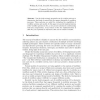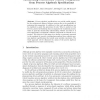141
click to vote
COORDINATION
2006
Springer
15 years 4 months ago
2006
Springer
Abstract. Enabling coordination among ubiquitous computing applicad resources requires programming abstractions and development tools tailored to this unique environment. This pape...
116
click to vote
COORDINATION
2006
Springer
15 years 5 months ago
2006
Springer
Abstract. Rebeca is an actor-based language which has been successfully applied to model concurrent and distributed systems. The semantics of Rebeca in labeled transition system is...
143
click to vote
COORDINATION
2006
Springer
15 years 5 months ago
2006
Springer
Mobile ad hoc networks (MANETs) define a challenging computing scenario where access to resources is restrained by connectivity among hosts. Replication offers an opportunity to in...
COORDINATION
2006
Springer
15 years 5 months ago
2006
Springer
Abstract. We present a model for choreography `a la WS-CDL and formalize it in DSTL(x), a spatio
129
click to vote
COORDINATION
2006
Springer
15 years 5 months ago
2006
Springer
Van der Aalst recently proposed a set of workflow patterns to characterize the kinds of control flow that appear frequently in workflow processes. These patterns are useful for eva...
124
click to vote
COORDINATION
2006
Springer
15 years 5 months ago
2006
Springer
In a previous work we have presented a formal framework devoted to show the relevance of choreography and orchestration in the design of service oriented applications. Even if usef...
150
click to vote
COORDINATION
2006
Springer
15 years 5 months ago
2006
Springer
Bigraphical Reactive Systems have been proposed as a meta model for global ubiquitous computing generalising process calculi for mobility such as the pi-calculus and the Mobile Amb...
113
click to vote
COORDINATION
2006
Springer
15 years 5 months ago
2006
Springer
How to coordinate the processes in a complex component-based software system is a nontrivial issue. Many different coordination approaches exist, each with its own specific advanta...
129
click to vote
COORDINATION
2006
Springer
15 years 5 months ago
2006
Springer
Process algebraic specifications can provide useful support for the architectural design of software systems due to the possibility of analyzing their properties. In addition to th...
126
click to vote
COORDINATION
2006
Springer
15 years 5 months ago
2006
Springer
The coordination language Paradigm allows for a flexible and orthogonal modeling of interprocess relationships at the architectural level. It is shown how dynamic system adaptation...



